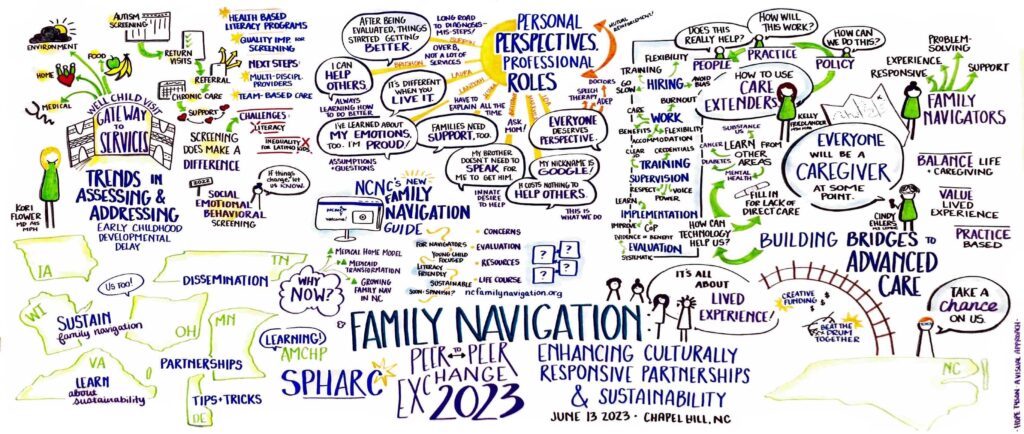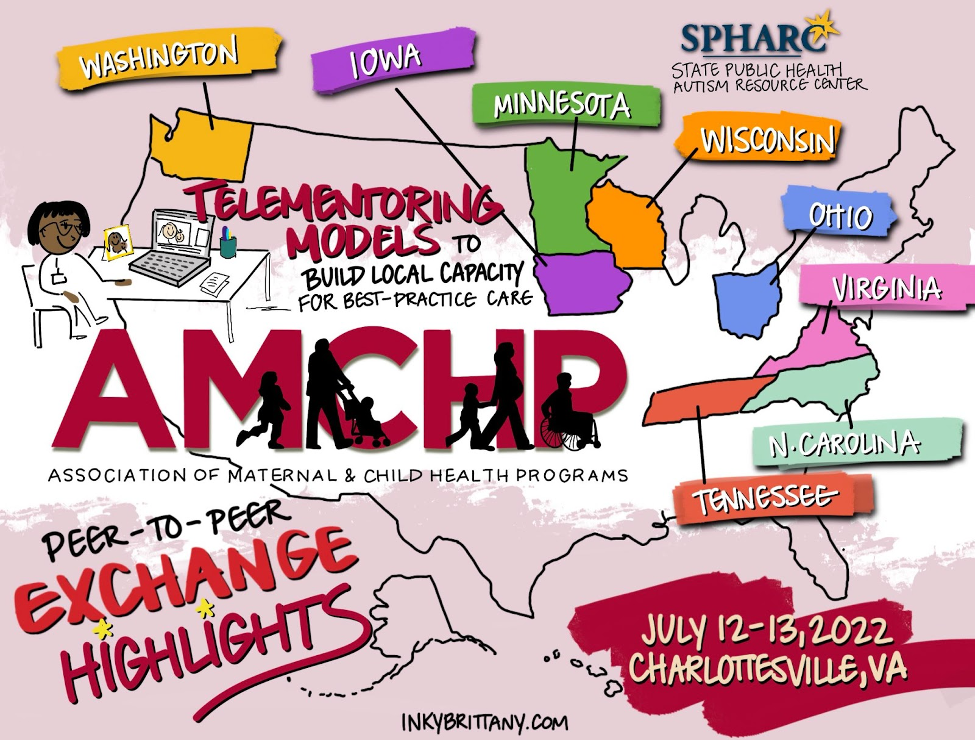PEER-TO-PEER EXCHANGE
One of SPHARC’s main peer learning opportunities is the Peer-to-Peer Exchange. Every year, SPHARC supports a state/jurisdiction to plan the Peer-to-Peer Exchange. The Peer-to-Peer Exchange was designed as a way for current and past ASD/DD state grantees to learn from one another about building systems of care for children and youth with ASD/DD. During this engaging meeting, participants share lessons learned, innovative ideas, exchange best practices, and develop action steps to continue to implement and sustain their work. When safe to do so, the Peer-to-Peer Exchange is held in-person because this provides a “hands-on” chance for participants to discuss issues face-to-face, which allows for a more in-depth learning experience than other virtual meetings or technical assistance provided by SPHARC.
2023 Peer-to-Peer Exchange
“Family Navigation: Enhancing Culturally Responsive Partnerships and Sustainability”

More than 60 participants from eight state teams gathered in person on June 13-14, 2023 for the annual Peer-to-Peer Exchange! The event was held on the University of North Carolina campus, in Chapel Hill, hosted and facilitated by North Carolina’s state team, with support from AMCHP staff, Paige Bussanich, Mallory Cyr, and Maura Leahy.
State teams in attendance were current (Iowa, North Carolina, Virginia, Wisconsin, Tennessee) and former (Ohio, Delaware, Minnesota) Health Resources and Services Administration state autism grantees.
The theme of the exchange was Family Navigation: Enhancing Culturally Responsive Partnerships and Sustainability. The rich agenda focused on identifying solutions for sustaining Family Navigation supports that extend beyond funding parameters, discussing strategies for enhancing cultural perspectives and engagement among diverse community-based providers and participants, and understanding the national status of screening/referral/follow-up in pediatric practices. We invite you to learn more about our fabulous speakers and panelists.
Activities included:
- A presentation of the North Carolina team’s Family Navigation Guide, complete with a demonstration of the website
- Learning about National Trends and Approaches to Assessing and Addressing Early Childhood Developmental Delay
- Discussion of strategies and lessons learned related to family and peer navigation for people with intellectual and developmental disabilities (I/DD) and ways to collaborate with Medicaid
- A panel called, “Incorporating Personal Perspectives into Professional Role,” with 6 presenters, including 3 adolescents and young adults, who all brought different perspectives of lived experience
- A panel on “Cultural Perspectives on Sustainability,” with presenters representing diverse cultural populations and lived experiences
- Using and applying learnings from the Program Sustainability Assessment Tool
- Lots of state networking opportunities, including the annual state poster gallery walk featuring work from all attending states
Highlights from the event were captured by local graphic recorder, Hope from A Visual Approach!
2022 Peer-to-Peer Exchange: Telementoring Models to Build Local Capacity for Best Practice Care

Over 45 attendees from seven state teams participated in-person or virtually in the annual Peer-to-Peer Exchange held on July 12-13, 2022 in Charlottesville, VA. The exchange, facilitated by the host state team from the University of Virginia’s Autism LINKS project and SPHARC staff members Paige Bussanich, Mallory Cyr, and Maura Leahy, aimed to increase understanding of how the use of Project ECHO* (ECHO = Extension for Community Healthcare Outcomes) and technology-enabled collaborative learning can be used to train community-based providers, identify ways to enhance learning and engagement among participants, and determine how to structure a program to meet the needs of the intended audience.
Other state teams in attendance were current (Iowa, North Carolina, Virginia, Wisconsin) and former (Ohio and Minnesota) Health Resources and Services Administration state autism grantees. Activities included:
- A panel of primary care physician champions who shared their experiences participating in ECHO
- A series of presentations that discussed the curriculum, lessons learned, outcomes, and partnerships of the following ECHOs hosted by the Virginia Autism LINKS project:
- ECHO for K-12 Educators and ECHO for Caregivers
- ECHO for Early Intervention
- ECHO Autism for Primary Care (integration of family navigation)
- Breakout sessions on integrating family/lived experience, evaluation and outcome assessment in ECHO, and tools/practical products that enhance and streamline care
- A historical overview of the original Community Asset Mapping (CAM) model and how the 2016-2019 Washington state autism grant team shared knowledge and support to the Virginia Autism LINKS project
- Discussion around the adaptation and implementation of CAM into ongoing virtual learning communities (VLCs)
- Small group activity on how to meaningfully infuse lived experience
We were also fortunate to have live graphic recording from Inky Brittany.
2021 Peer-to-Peer Exchange: Use of Telehealth, Virtual Supports, and Asynchronous Learning to Build Provider Capacity and Support Families
Over 50 attendees from eight state teams and several individuals with lived experience participated in the annual State Public Health Autism Resource Center (SPHARC) Peer-to-Peer Exchange on June 23-24, 2021. This year’s exchange was held virtually by way of Nashville, TN. The exchange, facilitated by the host state team from Tennessee at the Vanderbilt Kennedy Center’s Treatment & Research Institute for Autism Spectrum Disorders and SPHARC staff members Paige Bussanich, Mallory Cyr, and Maura Leahy, aimed to increase understanding of how telehealth can provide diagnostic or family support within communities, how online learning collaboratives can support and train community providers within medical or Part C systems, and how asynchronous learning/materials can be used to support families.
Other state teams in attendance were current (Iowa, North Carolina, Virginia, Wisconsin) and former (Georgia, Minnesota, Rhode Island) Health Resources and Services Administration state autism grantees. A highlight of the 2021 Peer-to-Peer Exchange was graphic recording by See in Colors.
2020 Peer-to-Peer Exchange: The Iowa Family Navigator Model: Providing Family-to-Family Support to Families of Children and Youth with ASD/DD
Over 65 attendees from eight states (current grantees: Iowa, North Carolina, Tennessee, Virginia (UVA), Wisconsin; former grantees: Delaware, Minnesota, Rhode Island, Virginia (Virginia Tech)) participated in the first fully-virtual Peer-to-Peer Exchange. The meeting was hosted by the Iowa state autism grantee team, located at the Iowa Title V CYSHCN program, from August 11-13, 2020. Attendees learned about the Iowa Regional Autism Assistance Program and how Iowa developed and has sustained a robust, statewide Family Navigator Network including training, certification, and continuing education. Attendees also learned about Iowa family engagement activities, including the development of the Iowa Family Leadership Training Institute. While parents and primary caregivers of children with/at risk for ASD/DD have significant life experience, there remains a need for training to help families partner with professionals at the individual, community, system, and policy levels. Through self-reflection and skill-building, family training opportunities can increase the capacity of families to improve communication with providers, work with community partners to identify service gaps, and make health care systems more family-centered.
2019 Peer-to-Peer Exchange: Using Data and Quality Improvement to Improve Health Equity in Autism Care
Over 60 attendees from nine states participated, either in-person or virtually, in the 2019 Peer-to-Peer Exchange in Madison, WI on April 16-17, 2019. The meeting aimed to increase knowledge about and resources for using data and quality improvement (QI) to advance health equity. The participating states – both current (Delaware, Rhode Island, Washington, and Wisconsin) and former (Georgia, Maryland, Minnesota, New Hampshire, and Ohio) Health Resources and Services Administration (HRSA) state autism grantees– learned more about Wisconsin’s work focusing on disparities through the Wisconsin Care Integration Initiative (WiCII) and three regional Engaged Community Quality Improvement (ECQuIP) sites in the state.
Activities included:
- Small group breakout sessions that allowed participants the opportunity to learn more about what other states are doing around ASD/DD related to using data, engaging communities, and QI
- A peer-led panel on engaging people most impacted by inequity
- Action planning in state teams
The current grantees participated in an additional half-day meeting of the Community of Learners after the Peer-to-Peer Exchange that focused on sustainability strategies and other grant-related activities using implementation support checklists.
2018 Peer-to-Peer Exchange: ASD/DD and Telehealth: Creating Connections for Children and their Families, Self-Advocates, and Providers
The 2018 SPHARC Peer-to-Peer Exchange took place in Spokane, WA and was hosted by the Washington State Department of Health grantee team. Peer-to-Peer 2018 aimed to increase knowledge about and resources for telehealth through a variety of learning activities. The Washington state grantee team discussed how telehealth provides an opportunity to fulfill the need for services and supports for children and their families and providers through their work on a statewide capacity assessment, Creating Connections: Addressing the Needs of Children with Autism and Other Developmental Disabilities Using Telehealth.
Washington’s Autism Spectrum Disorders and Other Developmental Disabilities project, AS3D, was a 2016-2019 HRSA Autism grantee that leveraged its resources and dynamic partnerships across the state to improve access to interventions and empower families of children with ASD/DD. During this meeting, participants learned how the WA AS3D team has collaborated with different partners, addressed challenges around funding and sustainability, and established buy-in to effectively strengthen policies at the state-level leadership and systems-level integration needed to ensure the timely identification of children and youth with ASD/DD through access to family-centered, comprehensive, coordinated, and culturally and linguistically competent services. Representatives from 10 states participated in the two-day meeting, including: Delaware, Iowa, Maryland, Minnesota, New Hampshire, Rhode Island, Texas, Virginia, Washington, and Wisconsin and the following themes were incorporated throughout all of the activities: cultural considerations and language access, social justice, the needs of rural and frontier communities and urban areas, self—advocate empowerment, and child/family-centric care.
2017 Peer-to-Peer Exchange: The Evolution of Family Navigation in ASD/DD Systems of Care
This Peer-to-Peer Exchange, hosted by Rhode Island’s (RI) The Autism Project (TAP), focused on Family Navigation. TAP was a 2016-2019 HRSA Autism grantee that leveraged its position as RI’s shared family resource center and its vast experience managing and integrating Family Navigators in the community to Improve Delivery of Education, Navigation, and Telehealth Information for Families, Professionals, and Youth (also referred to as Project IDENTIFY). Other state teams in attendance were current (Delware, Washington, Wisconsin) and former (Iowa, Maryland, New Hampshire, North Carolina, and Ohio) Health Resources and Services Administration state autism grantees.
During this meeting, participants learned how the RI team has collaborated with different partners, addressed challenges around funding and sustainability, and established buy-in to effectively integrate Family Navigators in the community. In addition, the RI team provided an overview of a tool they developed for Family Navigators to help the navigators determine their role with families, based on the stage of readiness the family is at when they are connected. The team facilitated an interactive discussion with the tool and shared recommendations/best practices for Family Navigators based on the various stages of the families they work with. RI also organized two panels: a family navigator and family leader panel to discuss their experiences with and in the system of care. The day and a half exchange ultimately allowed participating states to engage with the RI team and each other, share ideas and challenges, and develop action plans related to Family Navigation while receiving real-time feedback and resources to help address a need and/or improve a program.
You can also search “Peer Learning” in the SPHARC Resource Library to find specific resources from past Peer-to-Peer Exchanges. For any other questions about past Peer-to-Peer Exchanges, please email the SPHARC team at: spharc@amchp.org.
